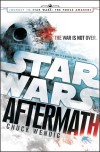Eifelheim
 Hard science fiction tends to elude me. First of all, I feel like I’m having to make too much of an effort to understand the science of the stories, but I’m a pretty smart guy, and besides, the stories usually work without the reader knowing all the details of the science. Secondly, hard science fiction novels tend to read like papers, and lack some of the “oomph” that I like in my fiction. Eifelheim is a hard science fiction novel, and I almost gave up on it three different times because it was so technical. What kept me going was the basic premise of the story.
Hard science fiction tends to elude me. First of all, I feel like I’m having to make too much of an effort to understand the science of the stories, but I’m a pretty smart guy, and besides, the stories usually work without the reader knowing all the details of the science. Secondly, hard science fiction novels tend to read like papers, and lack some of the “oomph” that I like in my fiction. Eifelheim is a hard science fiction novel, and I almost gave up on it three different times because it was so technical. What kept me going was the basic premise of the story.The novel goes back and forth between modern-day times, where a theoretical physicist and historian are a live-in couple, each addressing their own research challenges, and Medieval times, just as the Black Plague is devastating Europe. The historian is trying to figure out why a city named Eifelheim disappeared from the map in the 14th Century, never to be resettled, and the physicist is trying to figure out why the speed of light seems to be slowing down over time. The portion of the book set in Medieval times is set in the city of Eifelheim, where the events that forced the town to disappear are taking place. The story focuses on the priest at Eifelheim, a man who respects science and scientific thinking, but also has a strong faith in God.
The portions of the story intersect nicely. There’s more to the Medieval story than the modern one, but it’s arranged so that, when the historian is trying to figure out a certain part of the puzzle, we’ve already read what happened, and know the answer. It’s also interesting to note that, while the residents of Eifelheim are discussing the possible causes of the plague, and how it moves from place to place, the author focuses in on the dead rats in the city, and the dogs scratching at their fleas. It’s an interesting form of foreshadowing, and one that increases the reader’s sense of dread. I’ve come to learn that any book centered around the Holocaust or the Black Plague will be tragic, but that the stories themselves resonate because of the tragedy, and Eifelheim is no exception.
The book focuses on the minutiae of Medieval life, so much so that it tends to bog the story down. I had trouble keeping up with the different characters in Medieval times, but the author included a cast of characters at the front of the book, and he also structured the story so that you really only need to know about a handful of characters. You can follow them, and understand what’s happening to everyone else through them. The author also went to great pains to make that era authentic, all the way down to using particular terms and styles of language that jarred me out of the story, because I couldn’t make sense of it immediately. Still, though, not understanding all these details won’t detract from the story, but for those of you willing to make the effort, I expect it will add an extra level of depth to the story.
Another interesting aspect of the story is that it focuses strongly on the presence of faith, and its usefulness in old and modern societies. This comes to full light in the Medieval times, as the residents of Eifelheim struggle to come to terms with the foreigners who come to reside in their city. The clash of cultures forces both sides to reinvestigate their feelings about science and faith, and the result is a fine balance of understanding both. In this respect, I think the novel succeeds brilliantly.
There’s a moment of serendipity near the end of the novel that resolves the issues of the modern day setting, but it’s a minor quibble compared to the artistry of the story set in Medieval times. There’s a blurb on the back of the book about how Michael Flynn grants a very human presence to his stories, and while I doubted that ability through the first two thirds of the novel, by the time I finished the book, I understood the praise.
Eifelheim is not an easy read, but I think it’s well worth the effort. This and Rainbows End were both tough books for me to finish, but the resulting themes and conflicts more than made up for the extra time it took me to read the books. Just be forewarned that it may take you longer than you expect to finish them.






